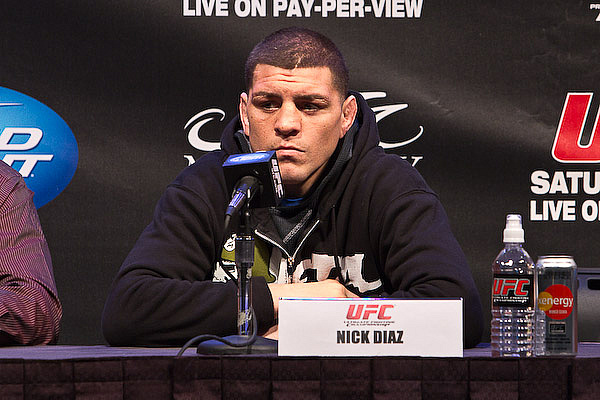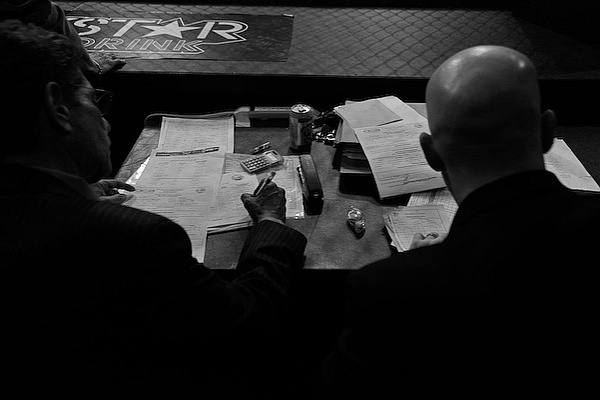The Doggy Bag: Now With More Nick Diaz!
The Rules, They Are a Changin’

Does
Nick Diaz makes too many headlines or not enough headlines?
Probably both. | Photo: Sherdog.com
The hustle and bustle of early 2012 has been so intense that there has been nary a weekend without a major card of some kind. It is a brief reprieve from the UFC’s gauntlet schedule before it reconvenes on Wednesday in Omaha, Neb.
In some way, this is a blessing. We can enjoy a flexible schedule and catch up with an old friend. Perhaps sit down to a nice dinner and argue about Nick Diaz.
Advertisement
Take your shoes off, have a drink and get into everything from Georges St. Pierre to rule changes and regulation to Bellator’s sixth season.
Oh, and plenty of Nick Diaz.

Could more changes be coming to a scoring table near you? |
Photo: Stephen Albanese
Can you comment on why most MMA people are typically against changing any rules in the sport? Many discuss getting “better judges,” educating them or defining the rules a bit more, but there is almost no talk about actually changing rules. When there is discussion, most seem resistant towards changes and say things like, “Get used to it,” “Play the game,” “That’s how the judges judge, so deal with it.”
My thought is that a sport this new should be testing and tweaking rules on a regular basis. Far bigger and older sports address issues and tweak rules annually; no reason MMA shouldn’t, too, in my opinion. Tweaks to judging, reffing, scoring criteria and legal/illegal actions could be the main areas to tackle. -- Jessie from Copenhagen
Jack Encarnacao, host of the “SRN Rewind”: The answer, Jessie, kind of depends on what you mean by “MMA people” being against rule changes. And even what it means to “change the rules.”
If by “MMA people” you are talking about fans, here is my feeling: fans by and large support changing the rules when the fighter they like better loses on a close call. When that fighter wins on a close call, you hear things like “get used to it” and “adapt.” That is sports.
A finer gradient is a fan’s favored fighting style. If you dig the way Carlos Condit fought against Nick Diaz, the rules are fine. If you prefer the way Diaz fights, the rules need to be changed. MMA fans seem to have a conviction that the rules should somehow encourage the types of fights they want to see, so they do not feel ripped off when a pay-per-view ends. That is business.
And the people who have the authority to change the rules of MMA -- government officials -- are not supposed to concern themselves with the business prerogatives of fight promoters and other private enterprises. That is counter to the ethics all the civics textbooks say come with a taxpayer-funded salary. Sure, the NFL can do whatever it wants tomorrow to enhance a fan’s enjoyment of the game, but the NFL does not need to convince the government to accept the change or own part of the responsibility for it.
Therefore, if when you say “MMA people,” you are talking about regulators and officials, the answer to your question is more complex.
The criteria for winning an MMA fight were designed to help the sport gain acceptance from controversy-averse politicians. Remind yourself of that. Then look at one particular component that people always seem to want added to the rules when a high-profile fight is very close: damage.
John McCarthy, in addition to his work as an iconic MMA referee, was also one of the earliest rule-writers of the sport. He worked with Jeff Blatnick in the 1990s to try to impose a framework on the sport before “mixed martial arts” was even a widely-known term.
Back then, the goal was to make ultimate fighting palatable to cable executives who had grown uncomfortable with the sport’s violence and the political rhetoric it sparked.
McCarthy and Blatnick’s original judging criteria included “damage,” the idea that the guy who does the most of it should win a round. The owners of the UFC at the time were not having it. The thought was there was no way a cable company would sign on to carry a sport that expressly rewarded inflicting damage on another human being. In fact, the thought was that really is not a sport; it is more tantamount to a street fight. The adage from those who oppose the sport has long been something like this: Yeah, football is dangerous, but the idea is to score points and win, not to hurt another man.
MMA would never have been socially accepted if the UFC insisted on stipulating that hurting another man is the primary way to win. They couched that in more boxing terminology, adopting ideas like ring generalship (“cage control”) and the 10-point must scoring system. It worked. Officials felt comfortable with boxing; they had regulated it for decades. The Unified Rules are not what they are because it is the perfect rule set for the mixed martial arts. They are what they are because that is the framework that was needed for the sport to survive.
More than a decade has passed since New Jersey and Nevada sanctioned the sport, you say. I doubt “damage” would fly today, either. The UFC is now linked with a television powerhouse in Fox and getting closer every day to attracting the same profile of sponsors all the other major sports do. The promotion actually started painting over blood on the mat with the first Fox show. The people holding up the effort to overturn New York’s MMA ban have put pressure on sponsors and Fox to drop the UFC because of how violent it is. People who do not like this sport are watching. These are high stakes for the industry. This is not just typing “damage” into the Unified Rules, getting a vote and letting them fight hoping no one notices.
In each state that sanctions MMA, the Unified Rules are either contained in state law or the code of regulations of a state agency like an athletic commission. The legal requirements that come with amending laws and regulations are arduous: public hearings, advertising, consensus-building, multiple drafts. You are talking six months to a year, even longer if any proposed change sparks controversy.
Further, it is not accurate to say the Unified Rules have not been changed. In 2009, the Association of Boxing Commissions adopted a rephrased and more specific set of rules intended to provide a framework for all North American commissions. Every state can put its own spin on this framework, and most do. That is another thing. You do not just “change the rules.” You have to change 40-plus sets of rules, in each state and every Canadian province that oversees MMA, all with their own political considerations.
In addition to clarifying things like “back of the head” and explicitly banning knees to the head on the ground, the 2009 Unified Rules sought to better define “effective offense.” In the case of striking, for instance, it became more explicitly clear that it is not just about the number of strikes that land but the quality of the strikes that land. That is a change.
It is also crucial to note that some states still do not even allow mixed martial arts.
The sport is still illegal in New York. Connecticut and Vermont still are not on board. The UFC, which has put immense resources into getting the sport sanctioned across the country, wants uniformity in every state to the greatest degree possible. It is easy and relatively safe for a politician to sign on to what every other state is doing -- a lot harder, though, for him to agree to be the guinea pig for adding “damage” to the mixed martial arts judging criteria, all because of the latest uproar over the latest close fight.
Continue Reading » Page Two: Marijuana and More Irregular Matters
Related Articles







